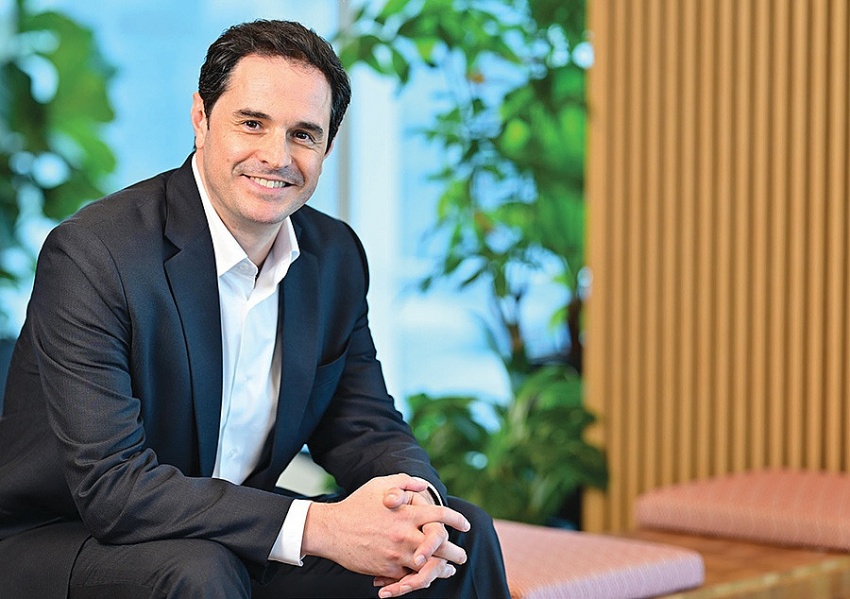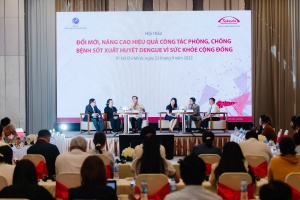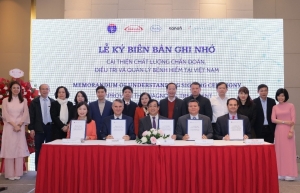Takeda’s decade of healthcare commitments in Vietnam
Given the dynamic nature of the pharmaceutical landscape in India and Southeast Asia, how does Takeda perceive Vietnam compared to other countries?
Vietnam is a fast-growing country with immense potential, especially when considering its rapid population growth and industrialisation. These factors drive increasing healthcare demands, particularly as the country deals with the effects of climate change and a rising incidence of both communicable and non-communicable diseases, which puts a significant strain on the healthcare system and create burdens for people and their families.
 |
| Dion Warren, Takeda’s area head for India and Southeast Asia |
Although Vietnam’s healthcare system has improved, there remains considerable room for growth within its infrastructure. Addressing these gaps requires local and cross-border strategic partnerships across various stakeholders. These partnerships are essential not only for improving disease education and diagnostic capabilities, but also for increasing patient access to both basic and innovative medicines.
With its rich heritage of innovation and experience in the global biopharmaceutical sector, Takeda is committed to partnering with Vietnam’s healthcare sector, as well as key public and private stakeholders, to address these challenges and improve the quality of people’s lives through sustainable and innovative healthcare solutions.
What differentiates Takeda from other pharmaceutical companies in Vietnam?
Takeda’s distinction lies in its core values, encapsulated by what we call Takeda-ism: integrity, fairness, honesty, and perseverance. These values guide every decision through our patient, trust, reputation, and business framework – ensuring we do the right thing for patients, build trust, maintain our reputation, and grow our business sustainably, in that order.
We believe in combining global insights with local expertise. In Vietnam, we leverage global knowledge and resources to deliver innovative solutions to local patients. At the same time, we collaborate with stakeholders to meet the country’s specific healthcare needs.
This approach ensures that high-quality medicines and vaccines reach those who need them. Through Takeda-ism and sustainable practices, we aim to become a trusted biopharmaceutical company, making a lasting impact on the health and wellbeing of Vietnam.
Can you share some of Takeda’s greatest achievements over the last 10 years?
In Vietnam, since 2021, we have partnered with the Ministry of Health (MoH), the National Institute of Haematology and Blood Transfusion, and numerous hospitals and diagnostic centres to improve access to diagnosis for hereditary angioedema patients and to offer locally based treatment for people with haemophilia.
We actively support programmes addressing the unmet needs of patients with rare diseases, providing plasma-derived therapies and innovative treatments for conditions such as multiple myeloma and Hodgkin’s lymphoma.
As an active member of the Japan Pharmaceutical Manufacturers Association and the Pharma Group under the European Chamber of Commerce in Vietnam, Takeda contributes to bringing innovative therapies and vaccines to the country while fostering cross-border exchanges between medical communities in Vietnam, Japan, and other countries in the region.
These collaborations include disease education programmes and public awareness activities, which empower healthcare professionals and the public with a greater understanding of diseases and healthcare options, facilitating the development of care guidelines for patients locally.
In May, we reached a significant milestone when the MoH approved Takeda’s dengue vaccine, making it the first dengue vaccine approved in the country. This innovation adds a vital prevention method to Vietnam’s integrated strategy to combat the rising public health threat of dengue.
Why did Takeda venture into vaccine development for the mass population?
For 70 years, Takeda has been supplying high-quality, safe vaccines to protect the health of those in Japan. In recent years, we have expanded this commitment globally, tackling some of the world’s most challenging infectious diseases, including dengue, influenza, and COVID-19.
Dengue is a complex disease that affects nearly half the global population, with recent severe outbreaks in Southeast Asia. Factors like climate change and urbanisation have exacerbated these outbreaks, increasing both the economic and public health burden.
While measures such as vector control and avoiding mosquito bites are critical, the rising number of dengue cases underscores the urgent need for an integrated strategy, as recommended by the World Health Organization. This includes surveillance, vector control, public education, and vaccination. The recent approval of Takeda’s dengue vaccine marks a significant step towards dengue prevention in Vietnam.
Takeda is known for collaborating with governments to make its dengue vaccine accessible to the public. What are its plans for Vietnam?
Takeda’s ultimate goal is to improve public health by delivering a safe and effective dengue vaccine that addresses the significant global burden of the disease. Our dengue vaccine has been approved in over 40 markets, including the European Union, Brazil, Argentina, Colombia, Indonesia, Thailand, Malaysia, and now Vietnam.
In Vietnam, Takeda is committed to making the vaccine widely accessible, particularly in remote areas and among high-risk groups, such as low-income families. Recognising the burden dengue places on public health and the economy, expanding vaccination coverage is a critical element of our infectious disease strategy.
To achieve this, we will continue strengthening partnerships with local health authorities, academic institutions, research centres, and vaccination centres. Our goals include raising awareness about dengue and the importance of vaccination, advocating for sustainable management policies, and providing comprehensive training for healthcare professionals in vaccination practices.
We are grateful for the trust and support of our partners and communities as we work to improve access to healthcare, ensure effective disease prevention, and enhance the quality of life in Vietnam.
| This week, Dion Warren and Dr. Derek Wallace, president of Takeda’s Global Vaccine Business Unit, will visit Vietnam. This marks the first visit by high-level global Takeda leaders to Vietnam, continuing Takeda’s series of activities and efforts in supporting the country in its dengue prevention journey. During the visit, the pair will spend time with Takeda’s local team initiating the official launch of Takeda’s dengue vaccine in Vietnam, following its approval by the Ministry of Health in May. |
 | Takeda Vietnam wins Best Workplace in Asia 2022 award by Great Place to Work Takeda Vietnam has prevailed over thousands of organisations to win the Best Workplace in Asia 2022 award by Great Place to Work, the global authority on workplace culture. |
 | Takeda Vietnam enhances effectiveness of dengue prevention and control The Pasteur Institute in Ho Chi Minh City joined hands with Takeda Vietnam to host a workshop on Innovating and enhancing the effectiveness of dengue prevention and control for public health on September 23. |
 | Takeda's commitment to health equity and access for rare disease community This year's Rare Disease Day, February 29, served as a momentous occasion to celebrate the extraordinary journeys of rare disease patients and their devoted caregivers. Having established a strong presence in the Vietnamese market over many years, Takeda holds steadfast in its commitment to bolstering the wellbeing of the Vietnamese people, especially those afflicted by rare diseases. Than Trong Son, head of Medical Affairs, Takeda Vietnam, delves into Takeda's tireless endeavours and commitment to supporting patients afflicted by rare diseases in the country. |
 | Takeda dengue vaccine approved in Vietnam The Drug Administration of Vietnam (DAV) on May 14 issued a decision approving dengue vaccine of Takeda Pharmaceutical Company Limited, becoming the first dengue vaccine approved in the country for use in individuals from four years of age, regardless of previous dengue exposure and without the need for pre-vaccination testing. |
What the stars mean:
★ Poor ★ ★ Promising ★★★ Good ★★★★ Very good ★★★★★ Exceptional
Related Contents
Latest News
More News
- Masan Consumer names new deputy CEO to drive foods and beverages growth (February 23, 2026 | 20:52)
- Myriad risks ahead, but ones Vietnam can confront (February 20, 2026 | 15:02)
- Vietnam making the leap into AI and semiconductors (February 20, 2026 | 09:37)
- Funding must be activated for semiconductor success (February 20, 2026 | 09:20)
- Resilience as new benchmark for smarter infrastructure (February 19, 2026 | 20:35)
- A golden time to shine within ASEAN (February 19, 2026 | 20:22)
- Vietnam’s pivotal year for advancing sustainability (February 19, 2026 | 08:44)
- Strengthening the core role of industry and trade (February 19, 2026 | 08:35)
- Future orientations for healthcare improvements (February 19, 2026 | 08:29)
- Infrastructure orientations suitable for a new chapter (February 19, 2026 | 08:15)

 Tag:
Tag:

















 Mobile Version
Mobile Version